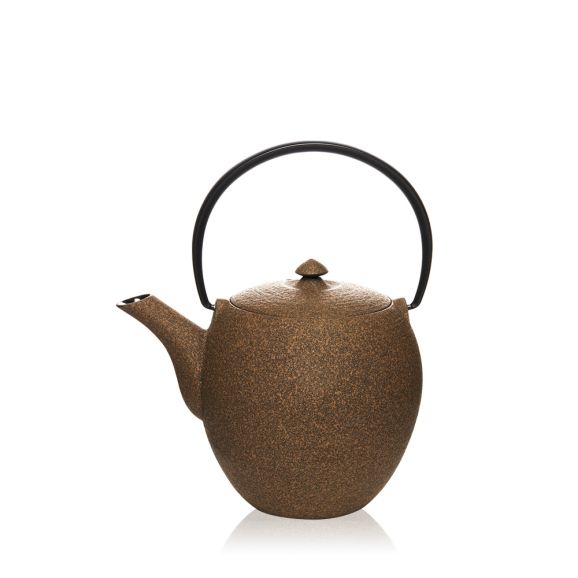Free shipping from $55
Description
The cast-iron teapot is an icon of Japan, crafted using time-honoured skills. This precious and personal object accompanies many tea connoisseurs throughout their lifetime.
The Mayu teapot from the WAZUQU foundry combines contemporary design and traditional Japanese craftsmanship. Created by Japanese designer Ken Okuyama, with a respect for traditional values, the Mayu teapot has a graceful and refined shape, while its aluminium alloy handle evokes the "katana", the finest of the Samurai's Japanese sabres.The slender non-drip spout makes pouring easy and accurate. This teapot is a chestnut colour with a black aluminium alloy handle. Over time, the colour of the teapot may change due to a natural process.This enamelled teapot (the interior is protected by a food-safe varnish) comes with a stainless-steel filter.
Advices
Before using your teapot for the first time, follow the steps below:
1 – Fill the teapot with boiling water.
2 – Wait for a minute, and then empty out the water.
3 – While the teapot is still warm, wipe the outside with a dry cloth.
4 – Repeat this process 3 or 4 times.
5 – Leave the teapot to dry naturally, inside and out, for about 30 minutes.
To preserve the quality and beauty of your teapot, follow the steps below:
1 – After using the teapot, rinse it out with hot water, avoiding the use of detergents.
2 – Dry the outside of the teapot while it is still warm.
3 – Never use an abrasive sponge to clean your teapot; instead, wipe it with a soft cloth.
4 – Always leave the inside of the pot to dry with the lid off.
5 – To avoid stains and rings, never leave water or tea in your teapot for too long.
6 – Before putting your teapot away, be sure that it is completely dry, inside and out and if possible, store the lid separately.
If you follow this advice, your teapot will remain in excellent condition and will last a lifetime.
Context
The WAZUQU foundry: tradition and innovation
WAZUQU is a traditional Japanese foundry that has been operating since 1604, based in northern Japan (Yamagata).
The name of the foundry, "Wa-zuqu", refers to a type of Japanese cast iron. This type of cast iron was used in Japan until the Edo period, to make swords and scissors. Today, there are just a few workshops in the world that still make teapots using this extremely pure Wa-zuqu cast iron.
Teapots made by the WAZUQU foundry are very comfortable to handle, being on average 25% lighter than typical Japanese cast-iron teapots, thanks to the artisanal expertise perfected over more than 400 years.
The cast iron used by this foundry is composed of 70% recycled materials. However, the quality of its products is just as high as that of products made from new raw materials.
The WAZUQU foundry is environmentally conscious, and its packaging is made out of waste recycled from wheat flour processing. This means it can be thrown away with food waste.
